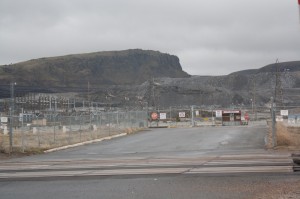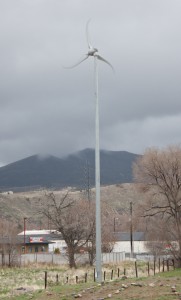For those of us, in Idaho, that like the idea of renewable, clean, energy sources, like wind and solar, it seems efforts to bring wind power to our state is blowing against the wind.
Just a few years ago the Idaho media was full of positive stories about wind energy bringing needed jobs, and power, to the state.
Now efforts to stop wind power expansion in the state, in the past couple of years, have made it all the way to the state capitol. In April the legislature refused, by a slim margin, to extend tax credits for wind farms.
A lobbyist for one company said they would not be able to build any new wind projects without it. It’s also true that many big (and evil) companies have gotten their hands in the Idaho wind power cookie jar, like General Electric (Fukushima Daiichi nuclear disaster) and British Petroleum (Gulf of Mexico oil disaster), so those particular corporations certainly don’t need tax breaks.
The point is that for the past couple of years there has been an all out effort to stop wind power development in the state of Idaho.
Here on the eastern side of the state, one city who originally welcomed the wind, is now saying they made a mistake.
Idaho Falls, in Bonneville County, is energy independent, providing their own power from hydroelectric dams on the Snake River. But as their city grew, their electric power couldn’t keep up. Idaho Falls looked to wind power to maintain their energy independence. Now you can see wind turbines east of the city. To independent minded tech junkies it looks cool, but, apparently to home buyers it’s a blight.
Idaho Falls real-estate agents claim they lost sales because of the wind farms: “There is nothing more tempting to the buyer than the smell of freshly baked cookies,” but when they saw the “…monstrous turbines, they marched right out of the house.”-Connie Clawson, Idaho Falls real-estate agent
Property near the turbines have seen their values go down. Cities and counties don’t like that ’cause that’s where they get most of their tax revenues from. As a result Idaho Falls halted any more wind turbine development.
In Bingham County, Idaho, officials denied the second phase of a proposed wind farm, after approving the first phase. Officially it was blamed on a vague 1984 county code. But one county commissioner admitted that property values was a factor: “My biggest concern was probably property values that would be affected.”-Ladd Carter, Bingham County Commissioner
Here’s a point I’d like to make about property values. Think of who really benefits from high property values: Real estate agents, counties and cities and school districts that rely on the property tax, and property speculators (remember, those people who created the housing market bubble). High property values don’t really benefit the people who plan on living in their homes for a long, long time.
Several years ago, people in Pocatello wondered what was to become of the abandoned FMC/Astaris phosphorus refining plant. The city announced a plan to turn it into a coal fired power plant. Residents were shocked, mainly because the FMC site was the cause of a Federal Superfund cleanup, and the nearby Native American reservation had successfully sued over pollution issues.

FMC site
People thought; we have plenty of wind here, why not a wind farm? The elected officials (supposedly representing the “people”) of Pocatello, and the county of Bannock, played a delaying game with the public. They held several public hearings, in which it became clear they did not want to hear from people arguing for the wind farm. Finally the officials declared that there would be no more public hearings on the issue, and nothing has been heard since about using the old FMC/Astaris site for a wind farm. (Apparently the company involved in the coal fired plant plan, decided to abandon the FMC/Astaris site, and look into a site nearer to American Falls)
Pocatello did have a wind turbine manufacturer in operation, but right before December 25, 2010, they announced they were leaving town. Nordic Windpower moved to Kanasas City, Missouri, after less than two years of operations in Pocatello.
There is some hope for wind power. Pocatello voters elected new officials, and recently the city revised building codes for small wind mills. “If we really want to promote wind power in the city, which I believe we do, we need to make it easier for wind turbines to go in and delineate where they would be welcome and where they maybe would be inappropriate.”-Marjanna Hulet, Pocatello Planning and Zoning Commission
The Pocatello Community Charter School became the first site for small wind mill (so small you have to look for it). It wasn’t cheap, even though it was part of the ‘Wind for Schools’ program, they still had to raise funds from sponsors.

Charter school windmill in Pocatello.
There is a new project in Downey (same county that Pocatello is in; Bannock), Idaho, that will use “accelerated wind turbines”. The company, Pavilion (PVRE), claims the turbines will maximize wind, so even areas with low wind speeds can use wind power. That company is also looking at using the former Nordic Windpower facilities (in the old Pocatello naval gun plant) as a factory for its accelerated wind turbines.
Then there is the Federal BLM (Bureau of Land Management) land in south east Idaho, that’s scheduled for use as a wind farm. Unfortunately most of the power is destined for Nevada. And despite the company’s name, RES America, it’s run by a foreign company. RES is based in the United Kingdom (Britain).
Also, Ridgeline Energy (another foreign owned company, Veolia of France), is building a 79.2 megawatt wind farm in Rockland, near American Falls (also in eastern Idaho).
Photos by: Alex Hutchins (click on the pics to make them bigger)

